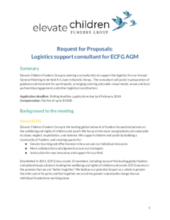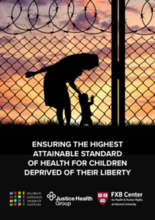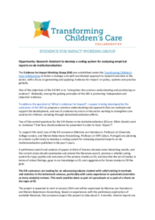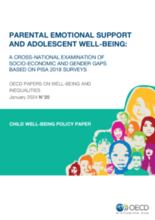Displaying 331 - 340 of 4400
Dr. Charlyn Harper Browne, Senior Fellow at Center for the Study of Social Policy (CSSP), will provide an overview of the newly released paper, "Expanding the Perspectives and Research Foundation for Strengthening Families and Youth Thrive," share updated definitions of the protective factors, and preview other new materials coming soon.
Elevate Children Funders Group (ECFG) seeks a consultant to support the logistics coordination for our Annual General Meeting to be held 4-6 June 2024 in Nairobi, Kenya. Local candidates will be prioritized.
Rolling review, applications due by 8 February 2024.
On 7 February 2024, the Global Social Service Workforce Alliance hosted a webinar to showcase the findings from their recently released 2023 State of the Social Service Workforce Report: A Decade of Progress, A Future of Promise.
The Global Social Service Workforce Alliance invites you to join them for an upcoming webinar, in which they will showcase the findings from their recently released 2023 State of the Social Service Workforce Report: A Decade of Promise a Future of Promise. They will delve into the report's insights, highlighting the significant progress that has been made to strengthen the social service workforce over the past decade and noting key priorities that must be considered when looking towards the future of workforce strengthening.
This report identifies, critiques, and synthesises current global standards for healthcare for children deprived of their liberty in all settings.
This handbook explores children’s lived realities of armed conflict and its aftermath and features empirical, conceptual and policy analyses alongside first-hand accounts of the experiences of war-affected children and youth.
Family for Every Child launched its global inter-agency guidance on supporting kinship care aimed at policy makers and programme managers during this webinar on 1 February 2024.
The special issue accepts research on traditional and non-traditional ACEs worldwide, which broadens our understanding of risk and protective ecological factors shaping health outcomes.
The Evidence for Impact Working Group convenors are looking for an advanced graduate student with solid training in methods and statistics in the behavioral sciences, preferably with some experience in systematic (narrative or meta-analytic) reviews. This work could be done as part of a practicum or as part of a thesis on the topic of de-institutionalization.
A cross-national examination of socio-economic and gender gaps based on PISA 2018 surveys





